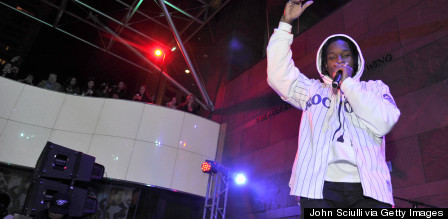
It was a shock to see newcomer A$AP Rocky, one of 2013's biggest stories, overlooked during the recently announced Grammy nominations. In fact, beyond "Fuckin' Problems" scoring a Best Rap Song nomination, A$AP was ignored, an embarrassing oversight by music's most influential collective. Now -- as 2013 draws to a close, and a slew of lauding rap retrospectives have emerged -- A$AP deserves a second look. In particular, one of the most understated tracks off his latest LP, "Fashion Killa" is especially in need of reassessment.
"Fashion Killa" -- one of rap's strongest singles since the Game's "Hate It or Love It" -- is a transcendent, almost deceptively heartfelt track off A$AP's debut album: LONG. LIVE. A$AP. Caught in a moment of possibility during his "fashion night out," "Fashion Killa" reveals hidden levels of depth in A$AP's music, offering a universal message of celebratory, invigorating love.
Although successful, A$AP is often criticized over a perceived lyrical weakness, or laziness toward the content of his songs. On the contrary, his "Fashion Killa" creates an immersive world that invites the listener to consider the momentary thrill of being in love. In A$AP's case, it is viewed through the prism of wealth and fashion, his "Fashion Killa" becoming a metaphor for his ideal woman.
He raps:
Her attitude Rihanna, she get it from her mama
She jiggy like Madonna, but she trippy like Nirvana.
In the immediate scope of his night, all A$AP's girl needs to do is challenge him. She pushes him to stretch his passion. That she matches him is clear in the song's early moments:
"Rockin', rollin', swaggin' to the max," as he compliments her, "Smiling is your treasure, you're so well put together," and contemplates a future that exists for both of them: "Go away together, we could get away forever." While fleeting, these sentiments capture the soul beneath the song; A$AP is not merely rattling off a list of his favorite designers, but crafting a narrative.
It is the song's chorus that is most revealing. Rather than taken as literal, A$AP's: "Her pistol go (bang, bang)," can be interpreted as the spark that draws him toward her. Her spirit speaks to him, and through her lust for life, he finds power and, possibly, redemption. In its own way, there is something oddly romantic about being with someone, and having the words: "I said her pistol go -- 'Cuz she a fashion killa," cross your mind.
In A$AP's perfect vision, he is not indulging in a fantasy of boundless sexual conquests, or ridiculing his girlfriend for daring to love (or control) him. Instead, his "Fashion Killa" is a partner, someone with the same tastes and ambitions as him. And, ultimately, he contemplates a time when everything they have worked for manifests, as he describes:
Versace got a lot, but she may never wear it,
But she save it so our babies will be flyer than their parents.
Through this, expensive tastes are no longer a mere status symbol, but represent the potential of long-term success and happiness. Poignantly, however, when placed within the context of the album, the final question on "Fashion Killa" becomes: Do the song's sentiments embody true growth for the rapper, or are they temporary expressions from a night of fun?
A fitting bookend to 2013, "Fashion Killa" first officially became available with the release of LONG. LIVE. A$AP. back in January -- the song finally released as a single last month. Its music video -- currently at 6,700,000 views on YouTube -- features Rihanna in full on pixie-muse mode. Filmed with steady long shots and condensed to a bleak assortment of color, the music video for "Fashion Killa" is a celebration of the sweet joys of young love and newfound wealth over the sordid violence of street life. In its closing moments, an ominous threat throughout the video is revealed to be nothing more than a street artist spray painting "ART" on a building. Through his music video, A$AP is able to retain his credibility, while quietly suggesting there is more to urban life than nihilism and bloodshed.
In a world where most relationships have been reduced to a series of isolated exchanges, passion and subtext live supreme in the world of hip hop. Rappers, surprisingly, are ideally placed to articulate the stuntedness of today's "Me Generation," with "Fashion Killa" serving as a fitting encapsulation of young America's savvy, and even their quiet yearning for love. In their bravado and coda, hip hop artists have become unlikely gatekeepers for our own hidden need for escape.
A$AP Rocky is then an apt ambassador, as his song "Fashion Killa" is one of the most genuine, yet subversive hip hop ballads of the year. In it, A$AP imagines briefly a future for himself with a specific quality of life unusually expressed by a mainstream rapper. Balanced by an indie-influenced beat he produced alongside Hector Delgado and Friendzone, "Fashion Killa" suggests there is more to A$AP than "Fuckin' Problems."
2013 gave him his start -- it is now up to A$AP to decide what his future holds.
Song of the year (sorry, Lorde).
